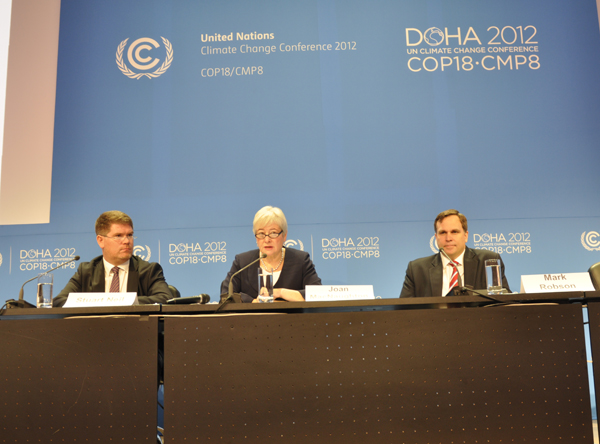Index outlines path towards energy sustainability
- By staff reporter Mi Xingang in Doha, Qatar
 0 Comment(s)
0 Comment(s) Print
Print E-mail China.org.cn, December 3, 2012
E-mail China.org.cn, December 3, 2012
Achieving energy sustainability remains a tremendous challenge as countries are faced with difficulties in balancing energy security, social equity and the mitigation of environmental impact.
 |
|
The World Energy Council (WEC) releases the energy sustainability index on Dec. 1 during the UN Climate Change Conference in Doha, Qatar. [Mi Xingang/China.org.cn] |
The Energy Sustainability Index, included in the 2012 World Energy Trilemma report, ranks the likely capacities of 93 WEC member countries to develop a stable, affordable and environmentally sensitive energy system. The rankings also take into account the aggregate effect of energy policies implemented by each country over time. The report also provides recommendations from CEOs and executives of leading companies as to how policy makers can speed up progress toward energy sustainability.
The Index was released on December 1 by the World Energy Council (WEC) during the UN Climate Change Conference in Doha, Qatar.
The rankings reveal that mitigating humans’ impact on the environment continues to be a universal problem. Providing high-quality and affordable energy access remains a challenge for developing and emerging economies. Meanwhile, countries at various stages of development remain in constant struggle for their own energy security. Sweden and Switzerland occupy the top two positions in terms of energy sustainability, according to the ranking.
"Countries that use a larger share of low-carbon energy such as renewable and nuclear as part of diversified energy mix tend to perform better,"said Joan MacNaughton, Executive Chair of the report and also Vice Chair of the UN Framework Convention on Climate Change (UNFCCC) High-level Panel on the Clean Development Mechanism. "What distinguishes all these countries from the others is that they have more effective and coherent policies.”
Mark Robson, a partner at Oliver Wyman, the global consulting firm which compiled the index, said: "Businesses must be assured that the economics of their investments won’t be destroyed by changes in energy policy. This policy risk is a key factor holding back energy investments today.”
At the Doha conference, MacNaughton stressed the significance of establishing coherent and predictable energy policies. She added that consistency is absolutely a prerequisite for optimizing the energy mix. Regional coordination also plays an important role as energy resources or markets are not defined by national borders. She also introduced the supporting measures to attract long-term investment and highlighted the necessity of research and development of energy technology.
MacNaughton said that all countries must decrease their environmental impact while supporting affordable and accessible energy. The Index pinpoints the sectors where countries need to work harder, she said.






Go to Forum >>0 Comment(s)